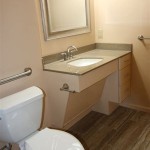Best Bathroom Shower Tile Designs: A Comprehensive Guide
The bathroom shower is a focal point of personal hygiene and contributes significantly to the overall aesthetic of the bathroom space. Selecting the most appropriate tile designs for this area requires careful consideration of various factors, including durability, water resistance, slip resistance, ease of maintenance, and overall aesthetic appeal. This article provides a detailed exploration of some of the best bathroom shower tile designs, categorized by material, style, and application, offering a comprehensive guide for homeowners and design professionals alike.
Ceramic and Porcelain Tiles: Versatility and Affordability
Ceramic and porcelain tiles remain a popular choice for bathroom showers due to their versatility, durability, and affordability. Both materials are manufactured through a process of heating clay-based materials at high temperatures, but porcelain is typically fired at higher temperatures, resulting in a denser and less porous tile compared to ceramic. This reduced porosity makes porcelain more water-resistant and thus a better choice for showers, where constant exposure to moisture is expected.
Ceramic tiles offer a wide range of design options, including various colors, patterns, and textures. They are relatively easy to cut and install, making them a cost-effective option for DIY projects. However, their higher porosity requires proper sealing to prevent water penetration and staining. Glazed ceramic tiles are particularly suitable for shower walls, as the glaze provides an additional layer of protection against moisture.
Porcelain tiles, on the other hand, are known for their exceptional durability and resistance to scratches, stains, and water. Their dense composition makes them suitable for both shower walls and floors, even in high-traffic areas. Porcelain tiles can mimic the appearance of natural stone, wood, or concrete, offering a wide range of aesthetic possibilities. While they may be slightly more expensive than ceramic tiles, their superior performance and longevity often justify the investment.
Within ceramic and porcelain tile options, specific designs can enhance the shower experience. Subway tiles, typically rectangular in shape, are a classic and timeless choice. They can be arranged in various patterns, such as horizontal, vertical, or herringbone, to create different visual effects. Larger format tiles, which reduce the number of grout lines, are increasingly popular for their sleek and modern appearance, as well as for easier cleaning. Textured tiles, which provide a tactile surface, can enhance slip resistance and add visual interest to the shower space.
Natural Stone Tiles: Luxury and Unique Character
Natural stone tiles, such as marble, granite, slate, and travertine, offer a luxurious and sophisticated aesthetic for bathroom showers. Each type of stone possesses unique characteristics in terms of color, veining, and texture, creating a one-of-a-kind look. However, natural stone requires careful selection and maintenance to ensure its longevity and performance in a wet environment.
Marble is prized for its elegant veining and smooth surface. It can add a touch of luxury to any shower space. However, marble is a porous material and susceptible to staining, etching, and water damage. It requires regular sealing and cleaning with pH-neutral cleaners to maintain its appearance. Honed marble, which has a matte finish, is generally preferred for shower floors as it offers better slip resistance compared to polished marble.
Granite is a highly durable and water-resistant natural stone. It is available in a wide range of colors and patterns, making it a versatile choice for shower applications. Granite is less porous than marble and requires less maintenance. However, it can be relatively expensive and may require professional installation due to its weight and hardness.
Slate is a durable and slip-resistant stone with a naturally textured surface. Its dark, earthy tones can create a rustic and spa-like atmosphere in the shower. Slate is relatively water-resistant, but it still requires sealing to prevent staining and fading. Its textured surface can be more challenging to clean than smooth tiles.
Travertine is a porous stone with distinctive holes and pits. It offers a warm and natural aesthetic. Travertine tiles are typically filled and sealed to create a smooth and water-resistant surface. However, they may still require regular maintenance to prevent water damage and staining. Honed travertine is generally preferred over polished travertine for shower floors due to its better slip resistance.
When using natural stone tiles in a shower, it is essential to use a high-quality sealant specifically designed for natural stone. Regular cleaning with pH-neutral cleaners is also crucial to prevent damage and maintain the stone's natural beauty. Proper ventilation in the shower area can help to minimize moisture buildup and prevent mold and mildew growth.
Glass Tiles: Modern Aesthetics and Light Reflection
Glass tiles offer a modern and sophisticated aesthetic for bathroom showers. They come in a variety of colors, shapes, and sizes, allowing for a wide range of design possibilities. Glass tiles are non-porous and resistant to water damage, making them an ideal choice for shower applications. They also reflect light, which can brighten up the shower space and create a sense of spaciousness.
Glass tiles can be used as accent tiles to add pops of color and visual interest to the shower. They can also be used to create entire shower walls or floors for a dramatic effect. Mosaic glass tiles, which consist of small pieces of glass arranged in a pattern, are particularly popular for shower applications. They can be used to create intricate designs and add texture to the shower space.
While glass tiles are water-resistant, they can be slippery when wet. Therefore, it is important to choose glass tiles with a textured surface or to use a slip-resistant coating on the floor tiles. Proper installation is also crucial to prevent water penetration and ensure the longevity of the glass tiles. A thin-set mortar specifically designed for glass tiles should be used, and the grout lines should be sealed to prevent water damage.
Cleaning glass tiles is relatively easy. They can be wiped down with a damp cloth or sponge. Avoid using abrasive cleaners, as they can scratch the surface of the glass. Regular cleaning is important to prevent soap scum and water spots from building up on the glass tiles.
Considerations for Grout and Waterproofing
While the tile itself is a significant factor in shower design, proper grout selection and waterproofing are equally crucial for ensuring the longevity and performance of the shower space. Grout fills the spaces between the tiles, providing structural support and preventing water penetration. Waterproofing is essential to protect the underlying substrate from water damage.
Epoxy grout is a superior choice for shower applications due to its non-porous nature and resistance to stains, mold, and mildew. Unlike cement-based grout, epoxy grout does not require sealing and is easier to clean. However, epoxy grout can be more difficult to install and may require professional expertise.
Cement-based grout is a more affordable option, but it is porous and susceptible to staining and water damage. It requires regular sealing to protect it from moisture. Cement-based grout is available in a variety of colors and can be used to create different visual effects.
Waterproofing is essential to protect the underlying substrate from water damage, which can lead to mold growth and structural problems. There are various waterproofing methods, including waterproofing membranes, paints, and sealants. The choice of waterproofing method depends on the type of substrate and the specific shower design.
Before installing the tiles, the substrate should be properly prepared. This includes cleaning the surface, repairing any cracks or imperfections, and applying a primer. The waterproofing membrane or paint should be applied according to the manufacturer's instructions. The grout lines should be sealed after the tiles are installed to prevent water penetration.
Design Styles and Tile Patterns
Beyond the material, the chosen design style and tile pattern play a significant role in the overall aesthetic of the bathroom shower. Different styles evoke different emotions and can transform the shower space into a sanctuary of relaxation and rejuvenation.
A minimalist approach focuses on clean lines, simple shapes, and neutral colors. Large format tiles in shades of white, gray, or beige are often used to create a seamless and uncluttered look. The emphasis is on functionality and simplicity, with minimal accessories and distractions.
A modern style embraces bold colors, geometric patterns, and unconventional materials. Glass tiles, metal accents, and concrete-look tiles are often used to create a striking and contemporary look. The emphasis is on innovation and individuality, with a focus on cutting-edge design.
A traditional style incorporates classic elements, such as subway tiles, marble accents, and decorative moldings. Warm colors, ornate details, and vintage fixtures are often used to create a timeless and elegant look. The emphasis is on comfort and familiarity, with a focus on creating a welcoming and inviting space.
A rustic style embraces natural materials, earthy tones, and textured surfaces. Slate tiles, stone accents, and wood-look tiles are often used to create a warm and inviting atmosphere. The emphasis is on nature and simplicity, with a focus on creating a relaxing and rejuvenating space.
Tile patterns can also play a significant role in the overall design. The herringbone pattern, which consists of rectangular tiles arranged in a V-shape, is a classic and elegant choice. The stacked pattern, which consists of rectangular or square tiles arranged in a straight line, is a simple and modern choice. The mosaic pattern, which consists of small pieces of tile arranged in a pattern, is a versatile and creative choice.

Bathroom Shower Tile Ideas

50 Cool And Eye Catchy Bathroom Shower Tile Ideas Digsdigs

Bathroom Shower Tile Ideas

Bathroom Tile Ideas Flooring Backsplash Shower Designs

Bathroom Shower Tile Ideas

40 Stunning Walk In Shower Ideas And Designs With Pictures

Discover 68 Creative Bathroom Shower Tile Ideas In 2024 Badezimmer Fliesen Ideen Bad Designs

15 Timeless Bathroom Tile Designs

25 Striking Shower Tile Ideas

10 Best Bathroom Tiles Design Ideas For Your Home
Related Posts







